
Module 2:
WHO THEY TARGET
Big Tobacco & the Hispanic/Latinx Community
“Spanish speaking consumers are extremely loyal to brands advertised to them…they can be expected to be loyal forever.”
- R.J. Reynolds
As early as the 1970s, tobacco companies targeted their marketing to the Hispanic community. During this time, advertisements featured iconic figures and themes that resonated with Hispanic culture, such as cowboys and rodeos. These images were intended to create a sense of ruggedness and adventure with using tobacco products.
The industry claimed the Hispanic community was “lucrative,” “easy to reach” and “under marketed.” Tobacco companies used U.S. Census Bureau data to track demographic trends to accurately target community members. The most notorious tobacco company to target the Hispanic/Latinx community was R.J. Reynolds with their Winston and Camel brands.
Here’s an overview of their internal market research:
R. J. Reynolds’ Hispanic Psychographics and Purchase Patterns: 1984 Summary and 1987
Psychographics
• Hispanics are very proud people with
strong family and cultural ties.
• Hispanics want to perpetuate their
traditions through future generations,
particularly through the use of the
Spanish language and traditional
religious beliefs.
• There is a growing sense of
“specialness” and unity among
Hispanics. One half of all Hispanic
Americans claim to be Hispanic first,
American second.
• Hispanics are more family oriented than
non-Hispanics.
• Hispanics share a common language.
Purchase Patterns
Hispanics tend to
• Believe that the biggest, most popular
brands are the best.
• Select name-brand goods over house
brands.
• Shop at small neighborhood stores.
• React favorably to Spanish-oriented
advertising, as long as it is executed
properly.
• Be more concerned with getting value
(quality for the price) than Americans as
a whole.
Source. RJ Reynolds Tobacco Company documents.
R. J. Reynolds’ Hispanic Smoker Personality Characteristics: 1982
Characteristic / Definition
Sociable
Sharing and enjoying their pleasure with others is an important aspect of the Hispanic smoker’s personality. Hispanics do not lose contact with family, friends, or the Hispanic community.
Emotional
Hispanics overall are full of feeling, somatically inclined, easily touched, and sentimental.
Pleasure Seeking
Hispanic smokers (particularly younger adults) devote considerable time and energy to the pursuit of pleasure, as evidenced by the many drug-, alcohol-, and sex-related anecdotes these respondents were willing to relate.
Polite
Being polite and considerate is very much a part of tradition-oriented Hispanic culture. Advertising that puts down or ridicules the competition or that uses boastful superlatives, often earns a negative reaction in this market.
Respectful
Hispanics are very respectful of others. There are some situations where smoking is generally seen as disrespectful and thus inappropriate, for instance, in front of parents or grandparents.
Macho
A quality with tremendous Hispanic appeal, “macho” is essential maleness. It is toughness, independence, strength, good looks, and sexiness. It is what the male wants to embody and what the female wants in her man.
Source. RJ Reynolds Tobacco Company documents.
1980s
1980s
As the Hispanic population grew in the U.S., companies began to produce bilingual advertisements. This strategy allowed them to communicate directly with the Hispanic community.
The “Nuestra Gente” (“Our People”) campaign was launched. The brand Winston was promoted using print advertisements promoting traditional Hispanic cultural values such as pride, loyalty, courage, challenge, family, friends, honesty, and aspirations.
The black and white Winston advertisement depicts a group of Hispanic men having a good time playing cards, which emphasized enjoyment and camaraderie.
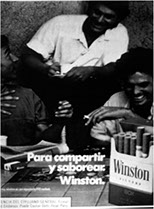
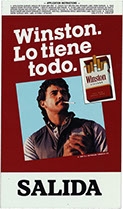
1990s
1990s
The Camel Hispanic Program was launched.“Hispanic consumers will enjoy and appreciate Camel’s identification of ‘their’ culture, specifically music, and will positively acknowledge Camel’s presence within their culture.”
The “Un Tipo Sauve” (“Smooth Moves”) advertisements were developed to focus their marketing on young adults. This program was a tactic for the company to focus on integrating into the Hispanic lifestyle.
These advertisements featured Hispanic entertainers and were only marketed in geographic areas with large Hispanic populations including San Antonio and Houston, Texas and Miami, Florida. The campaign included a 14-week tour with 98 events in 10 Hispanic markets with music festivals. They strategically placed Camel products in popular locations like markets, community events, and concerts.
The Smooth Moves Camel character, known as Joe Camel, was referred to as “smooth, self-confident, admired by peers, popular with women and one that challenges convention which is highly appealing to Hispanic smokers aged 18-24.”
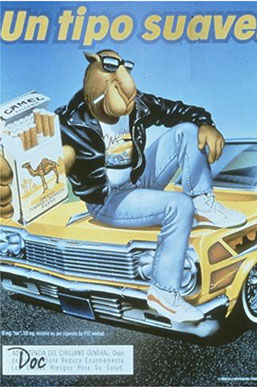
2000s
2000s
The “Kool Be True” a music-themed campaign targeted to African American and Hispanic youth was launched. The campaign featured ads with young, cool, multiethnic models and appeared in magazines that were popular with this group.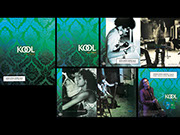
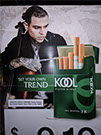
Big Tobacco Investing in the Hispanic Community:
“Black and Hispanics traditionally link their trial and purchase of products, and their legislative and editorial support, directly to their understanding and belief that a company cares about their communities and issues.”
- R.J. Reynolds CEO discussing the necessity of corporate contributions
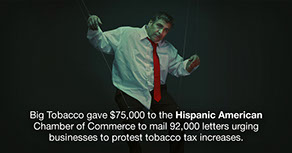
Another tactic tobacco companies use is donating money to organizations, community leaders, and Hispanic politicians to promote a positive image with the Hispanic community. Tobacco companies use civic organizations to indirectly market their names and products to Hispanic communities and reduce the perceived need for effective tobacco control laws.
In 2013, Altria, the owners of JUUL, made donations to Hispanic scholarship funds, chambers of commerce, caucuses, and other civic and business groups.
Sources for this section include Framing Health Matters, The Campaign for Tobacco-Free Kids, and the Truth Initiative.
Say What! EST. 2011
Home | About | Resources | Events | Speak Up | Login
Phone
512.245.8082
Mailing Address
Texas School Safety Center
ATTN: Say What Program
Texas State University
601 University Drive
San Marcos, TX 78666

Say What! was created and designed by young people from across Texas and connects students interested in eliminating tobacco from their schools and communities. The Say What! movement is funded by the Texas Department of State Health Services through a contract with the Texas School Safety Center at Texas State University.





